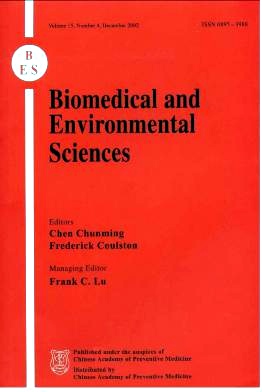Studies on the Oxidative Stress in Alcohol Abusers in China
-
Key words:
- oxidative stress /
- glutathione peroxidase /
- superoxide dismutase /
- negative correlation /
- correlation analysis /
- stepwise regression /
- healthy volunteers /
- linear regression /
- oxidative damage /
- alcohol drinking /
- vitamin C /
- In order
Abstract: Objective In order to study the relationship between alcohol abuse and oxidative stress, and to identify oxidative damage of alcohol abuse in human bodies. Methods 80 cases of male alcoholics (AL) aged 40 years old and 80 cases of male healthy volunteers (HV) of the same age without drinking history were investigated by measuring concentrations of vitamin C (VC), vitamin E (VE) and β-carotene (β-CAR) in plasma as well as activities of superoxide dismutase (SOD), catalase (CAT) and glutathione peroxidase (GSH-Px) in RBC with spectrophotometric assays. Results Compared with the average values (AV) of the above biochemical parameters in the HV group, the average values of VC, VE and β-CAR in plasma and the activities of SOD, CAT and GSH-Px in RBC in the AL group were significantly decreased (P = 0.0000). The findings in linear regression and correlation analysis for 80 alcoholics showed that with the prolonged drinking duration and increased daily drinking quantity, the values of VC, VE and β-CAR in plasma as well as SOD, CAT and GSH-Px in RBC in the alcoholics were gradually decreased (P = 0.000), representing a respectively significant linear negative correlation. The analysis of stepwise regression and correlation revealed that the drinking duration had the closest correlation with the values of VE in plasma as well as CAT and GSH-Px in RBC, while the daily drinking quantity had the closest correlation with the values of VC, VE and β-CAR in plasma as well as SOD and GSH-Px in RBC. Conclusion The findings of the present study suggested that the oxidative stress in the alcoholics became pathologically intensified, leading to potential oxidative damages in their bodies. Therefore, alcoholics should abstain from alcohol drinking, and should take as supplements suitable dosage of antioxidants per day such as VC, VE, β-CAR and others to moderate potential oxidative damages in their bodies.
| Citation: | ZHOU JUN-FU, CHEN PENG. Studies on the Oxidative Stress in Alcohol Abusers in China[J]. Biomedical and Environmental Sciences, 2001, 14(3): 180-188. |







 Quick Links
Quick Links
 DownLoad:
DownLoad: